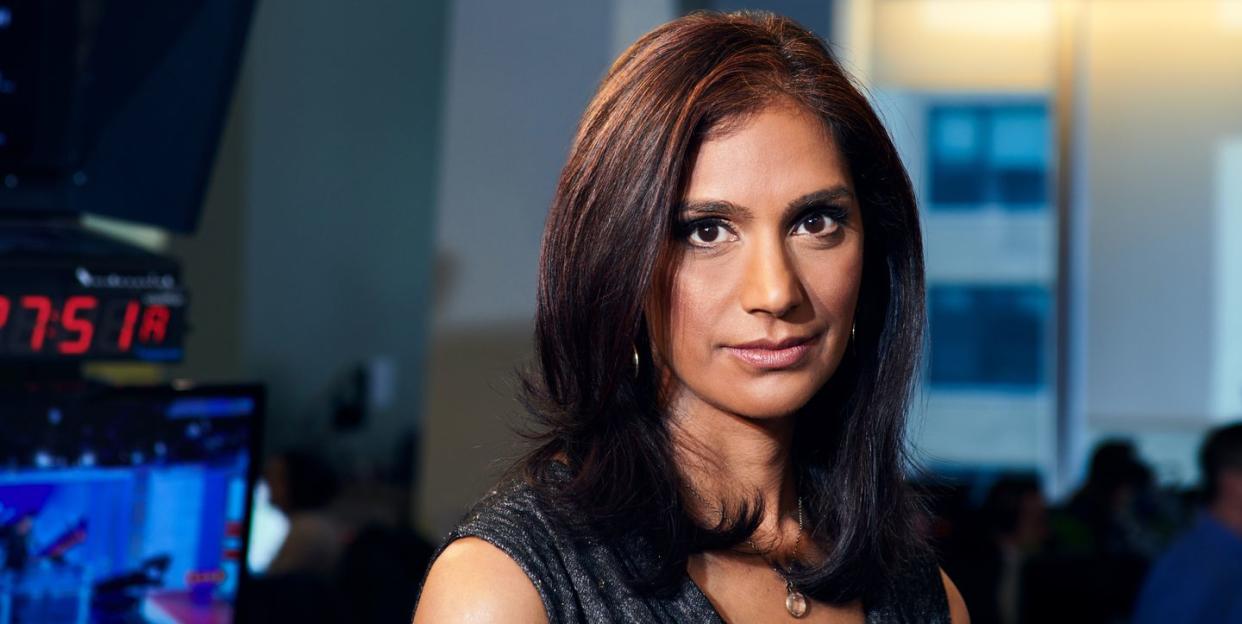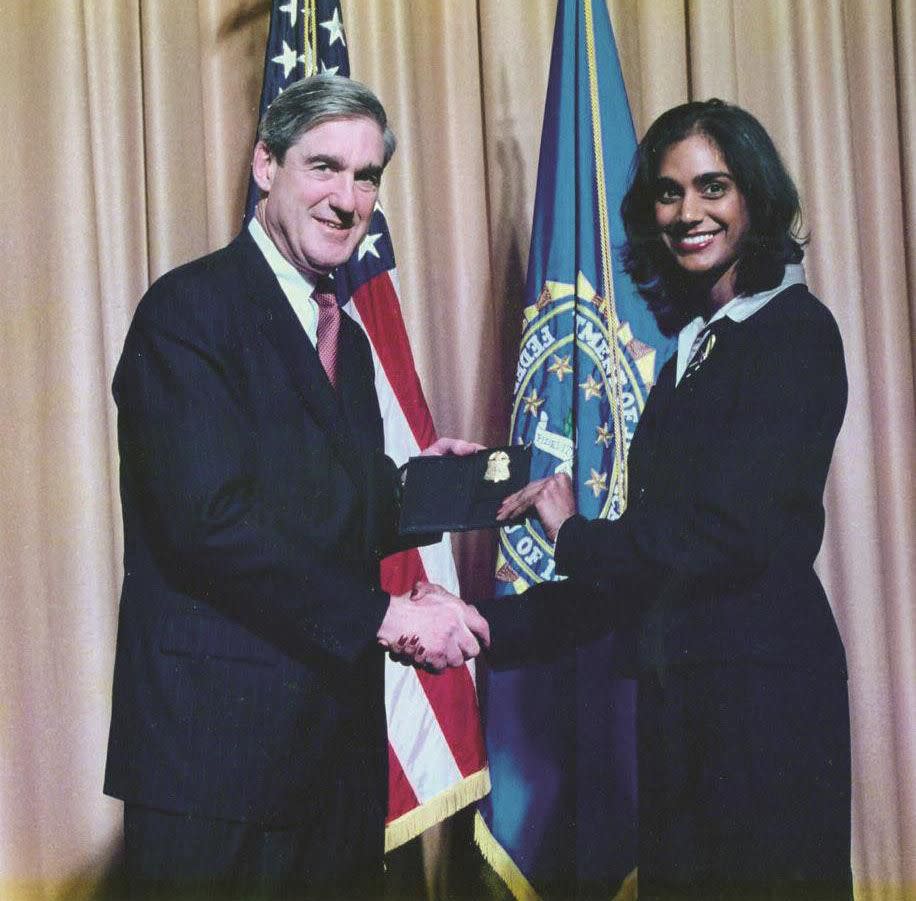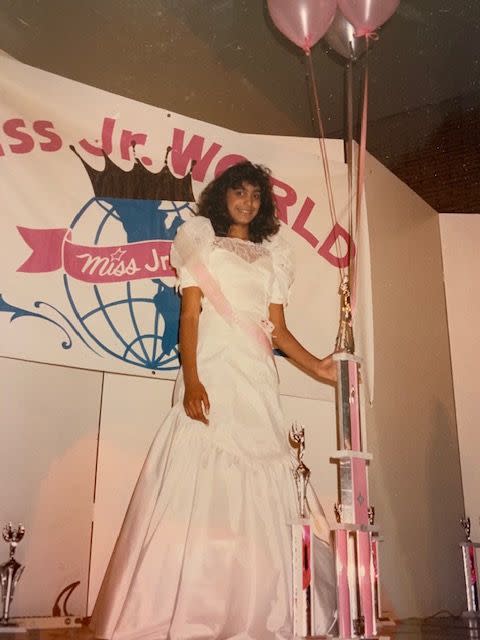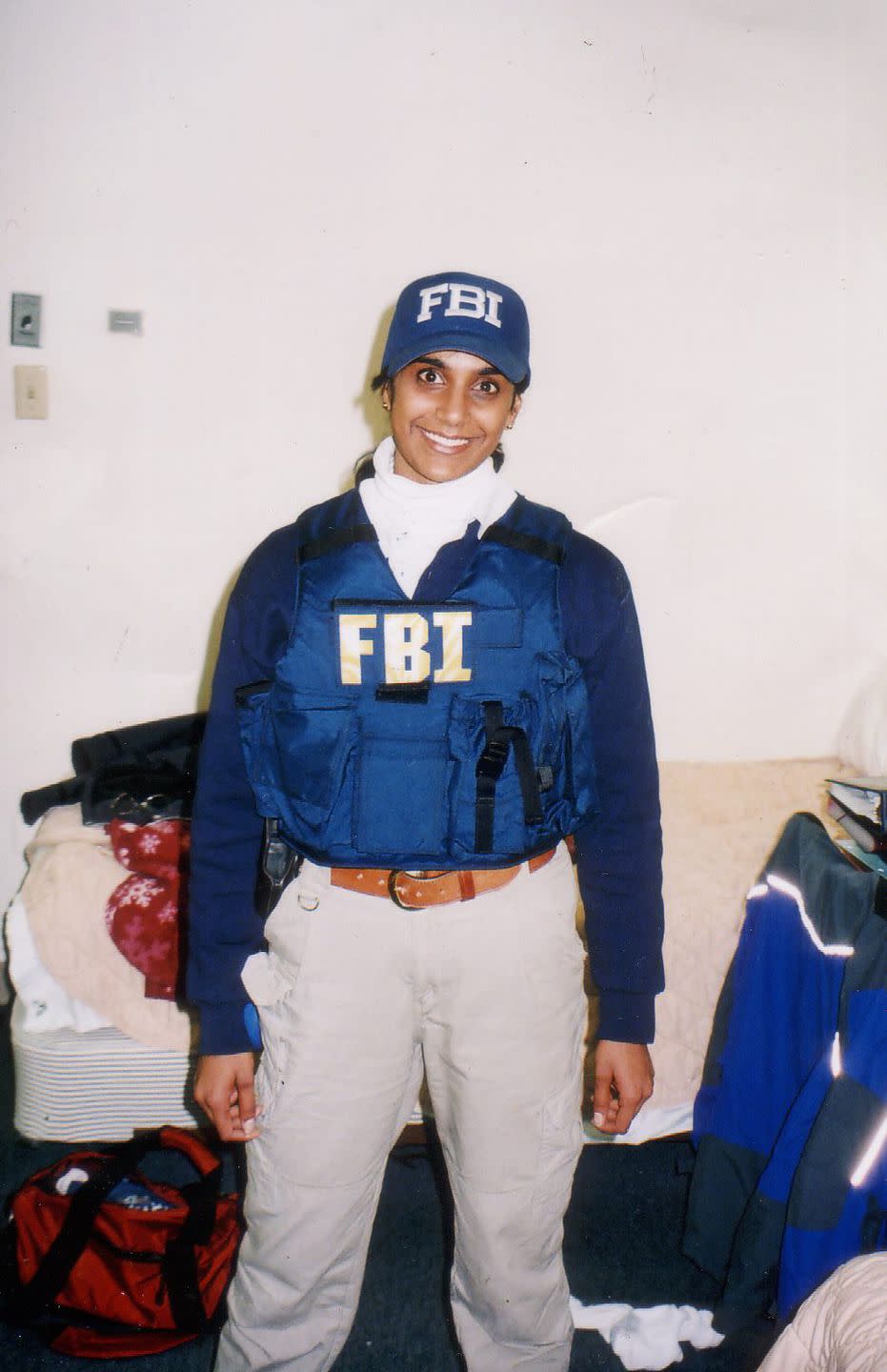FBI Agent Turned CNN Analyst Asha Rangappa Wants to Restore Your Faith in America

On a quiet Tuesday evening in the suburbs of New Haven, Asha Rangappa is discussing propaganda with her children. “Have you ever come across white nationalists on YouTube?” she asks her adolescent son. He pauses, prodding at his pasta and twisting his mouth. “You took too long to answer,” she says, “so you have!”
This, it seems, is typical; when your mom was once an FBI agent, you expect some dinnertime behavioral analysis. As the meal winds down, her son tells me that polygraphs are largely inaccurate and therefore inadmissible in court, and that “butt clenching” is a sign of lying. Expressionless, his little sister lies: “My name is Laura.” “Yeah, but did your butt clench?” She tells him, firmly, no.
I’m at Asha Rangappa's dinner table because, for the past few years, her commentary on CNN and Twitter has helped hundreds of thousands of people understand the news. The Trump administration’s lies, scandals, and erratic behavior can make the average person’s head spin, but Rangappa-a former FBI counterintelligence agent and a lecturer at Yale’s Jackson Institute for Global Affairs-answers all of my most pressing questions: Is the travel ban illegal? If the President didn’t collude, then why does he act like a Russian asset? Can he pardon himself?

Rangappa’s humor and intellect have won her a formidable following. In Twitter comments, her fans ask legal questions, post political memes, and compare her to Alex Parrish, the former FBI agent protagonist of Quantico, played by Priyanka Chopra. On TV, Rangappa's presence is disarming. Surrounded by men in dark suits, she wears bold colors-flamingo pinks, splashes of teal-that offset her glossy hair and luminous bronze skin. She speaks with an animated gravity, opening her eyes wide and lingering on important phrases to make her points. “I don’t think she uses the pronoun ‘I,’” her former FBI mentor Jack Eckenrode tells me. “She’s pointing to the record, and to history and precedent, and she’s looking at what has come before and interpreting it for people in an objective manner.” She’d rather lay out the legal threshold for impeachment than weigh in on what she thinks Congress should do.
If you could invent a political commentator with bipartisan credibility, she might look like Asha Rangappa: the child of immigrants from a military family, a woman of color with experience in law enforcement, and a passionate advocate of national security whose politics trend left-of-center. There is “no other commentator I know of who is coming from the perspective of a counterintelligence agent,” says fellow CNN legal analyst Renato Mariotti. This gives Rangappa rare and critical insight into the Mueller investigation, which was, at its heart, a counterintelligence probe of Russia’s interference in the 2016 election (collusion is merely a piece of this). Rangappa knows from experience how the FBI handles Russian spies and disinformation; add to the mix her professorial skill at explaining complex ideas, and she is ideally positioned to break down the bewildering political events of recent years.
Although her resume fits 2019 like a glove, Rangappa herself sits uneasily within our anti-establishment zeitgeist. Across the political spectrum, Americans feel that institutions-the police, the courts, the intelligence agencies, Congress-are irreparably broken, but Rangappa remains an institutionalist at heart. “I used to feel about this country that we were values-based,” she tells me. “I'm not saying this in a naive way. I know that the U.S. has engaged in many questionable things. But there was this idea that there were certain principles: rule of law, equal justice, freedom of religion and the press, these things. That's what I feel oriented around.” Defending these core values, and the institutions that preserve them, has become her foremost public role.

Rangappa, who is now 44, grew up in Hampton, Virginia, a coastal town in an area rife with military bases. Her parents came to the United States from India in 1970, during a wave of migration spurred by the Immigration and Nationality Act of 1965. “My parents came under a provision where the government was specially looking for doctors,” she says, “because the Vietnam war was happening and many doctors were overseas.” Rangappa’s father spent his career as an anesthesiologist for the U.S. Army on base in Virginia, while her mother worked as an accountant.
In school, Rangappa recalls, there were white students and black students, but nobody else of South Asian descent. Her background was so unusual in Hampton that, when she said she was Indian, people sometimes assumed that she meant Native American. “There was not this type of anti-immigrant sentiment then,” but her peers made her feel “exotic, at best.” She’s generous about this-sometimes Christians would tell her that, as a Hindu, her soul wasn’t saved, and she clarifies that this came from a place of “true concern.”
Rangappa was the type of strong-willed and opinionated kid whom adults identified as a future lawyer. Thinking that it would be “incredibly satisfying to put away bad guys,” she set her sights on becoming a federal prosecutor. Growing up in the ‘80s, amid the Cold War, she rooted for the United States to beat the Soviet Union in the Olympics, and she recalls a pervasive sense that “we had to fight for our values.” “It’s not like Reagan was a saint,” she acknowledges, but “in the American consciousness, there was a much more cohesive common American identity, a sense of who we were and what our values were, much more so than now.”

“Asha always had an interest in government service,” Cristina Rodríguez, Rangappa’s longtime friend, recalls. A graduate of Princeton and Yale Law School, Rangappa studied Colombian constitutional reform on a Fulbright, interned at the U.S. Attorney’s office in Baltimore, and clerked for a federal appellate judge in Puerto Rico. Then, after 9/11, she spent three years in the counterintelligence division of the FBI’s New York field office, where she believes that she was the first Indian-American woman to become a special agent. A Yale-educated lawyer could have sought any number of safe and comfortable jobs, but Rodríguez wasn’t surprised that Rangappa picked the Bureau: “It’s a very unconventional choice, but Asha makes lots of unconventional choices. I think that she pursues things because they’re interesting and compelling to her, rather than just following what everyone else is doing.”
In emails Rangappa sent to friends and family during her 2003 FBI training, she describes the Bureau transitioning, in the wake of 9/11, “from a focus on law enforcement to intelligence gathering.” Her writing is often funny (she refers to herself as a “major Frumpfest,” since concealing a weapon requires bulky clothes), but also sobering. The cadets practiced surveillance by following instructors around northern Virginia, they learned the legal parameters of deadly force, and they rehearsed emergency scenarios, such as ambushes and carjackings, in a “simulated town right on the Academy grounds.” “FYI,” she writes, “there are basically only three things besides a vest that will stop a bullet: a tree trunk, the engine block of a car, and a U.S. mailbox: if you are ever caught in gunfire, find one of those.”

Rangappa can’t talk much about what she did after training. The only story she offers about her time as an agent comes after she mentions that she did pageants as a child, and I ask the only possible follow-up question: whether she saw the movie Miss Congeniality, in which Sandra Bullock plays a special agent going undercover as a beauty queen. Rangappa laughs. “Oh, yes. The two great tastes that go great together: beauty pageants and the FBI.” Apparently, there’s some truth to the movie’s depiction of a female agent getting an interesting assignment because, in an overwhelmingly male workplace, she’s the only one who can do it.
Once, when a foreign intelligence target was going to meet someone at a restaurant, the Bureau asked her and another agent to go and pretend to be on a date. “I had this little purse,” she says, and “they wired it up.” She sat near the targets, put the purse on the edge of the table closest to them, and then began pouting-after all, she had to pretend to be on a bad date, because she needed an excuse not to speak over the recording. The targets never noticed. These men were trained to look out for a “tall guy with a crew cut wearing a suit,” she says, “but a pouty Indian girl on a date who’s mad at her boyfriend? They probably didn’t think twice about it.”
Rangappa loved the “immediacy” of the FBI-the feeling of “doing things that matter.” But three years in, she and her then-husband (also a counterintelligence agent) wanted to start a family. The logistics seemed prohibitive: for one, their family would not have been able to use the daycare at the Federal Building, because a child could not ride to work with them in their Bureau cars. (Parking those cars was another matter, since Law & Order constantly blocked traffic to film Federal Plaza. “It's literally post-9/11,” she says in disbelief. “Don't you want us to have our cars out there in case we need to be somewhere?”)
Leaving the FBI, Rangappa became the Dean of Admissions at her alma mater, Yale Law School, whose academic schedule was a better fit for their family. Alongside her professional successes is an equally important achievement: as a “tiger-ish mom,” Rangappa is raising two children, ages nine and twelve, who ask insightful questions about political ideology and explain to me that The Giver is an allegory of totalitarian communism. Now, Rangappa teaches national security law and related courses at Yale’s Jackson Institute for Global Affairs, while also running its admissions department and appearing constantly on podcasts and cable news.
A few days after Mueller delivered his report to the Attorney General, Rangappa sits in the hair and makeup chair, preparing to go on CNN Newsroom with Brooke Baldwin. “I’m a process person,” she tells me over the sound of the blow dryer, as stylists prod her hair and face. “Process is a manifestation of values,” such as equal justice, law and order, and basic freedoms. To her, it’s a way to enshrine these principles, apply them fairly, and safeguard them from corruption. “You can orient your way towards that and it won’t lead you astray.”
Throughout her life, Rangappa has known some of America’s most opaque and controversial institutions-the military, the courts, the FBI, elite universities-experiences that have strengthened her faith in institutional integrity. “Having seen how the sausage is made,” she tells me in reference to government surveillance, “I feel less worried about it.”
This is not to say that Rangappa is without skepticism or dissent. Bush era torture appalled her, for example, and she was so chilled by the 2011 killing of al-Qaeda operative Anwar al-Awlaki that she wrote in a candidate instead of voting for Obama’s second term. al-Awlaki was an American citizen, and to kill him without due process was, to her, “banana republic stuff” that violates “how an accountable democracy ought to operate.” Nonetheless, she has written of the civic importance of maintaining “faith in the primary pillars upon which our democracy is based-including the rule of law and the institutions that support it.”

In a moment when American institutions are under real threat, there’s an urgency to Rangappa’s vigorous defense of democracy. The President of the United States is attacking any person or process that challenges him: disparaging judges whose rulings he dislikes, asking his Attorney General to prosecute his opponents, and firing the FBI director for investigating him, to name a few. The Russian government has mounted a disinformation campaign (stealing and leaking emails from the Democratic National Committee, bots sowing discord on social media), with an eye to undermining faith in American institutions and processes, including elections and the courts. Amid these threats, Rangappa’s commentary helps the public understand how our embattled institutions work and why they matter.
At the same time, though, marginalized communities have catalyzed a public reckoning over institutional failures like police brutality, mass incarceration, and voter suppression. When I ask how someone who understands racial disparities in sentencing can put their faith in the impartial machinery of justice, Rangappa protests that I’m bringing up an issue related to bad policy or individual judges, not the justice system itself. During the Trump presidency, she says, the justice system is “the only branch that’s doing its job.”
This view is common among commentators with a law enforcement background, but critics from the defense side see a justice system shot through with policies and procedures that disadvantage marginalized groups, such as cash bail and racial profiling. The neutral and fair justice system, Fordham law professor John Pfaff recently wrote, is “a laudable system, well worth defending. But it is also one that does not actually exist.”
You don’t have to agree with Rangappa about the virtue of institutions to appreciate her insights into how they work. The Trump presidency, after all, has raised a morass of questions that require granular institutional knowledge. How did the FBI evaluate the Steele dossier? Can a sitting president be indicted? Summoned to answer questions like these, a powdered and coiffed Rangappa rides the elevator to the studio where Brooke Baldwin is taping. A producer mics her and grooms Baldwin’s flyaway hairs. On the screen behind them, a photograph of James Comey appears. They’re live.
Rangappa starts out technical, explaining that Mueller might have chosen not to weigh in on obstruction because he interpreted Justice Department policy as implying that Congress should decide. Then, she zooms out: “For the benefit of the country, for both sides to put to rest all of the speculation, we need to see the actual report.” She seems measured and authoritative, an expert rather than a partisan. She wields no pitchforks, just an invocation of law and process, an appeal to common cause.
Afterwards, she tells me that “as long as the President of the United States is the person that is maligning our institutions,” defending democracy will be difficult. Law and national security can seem “like a labyrinth” to the lay public; she hopes to take these issues and “break them down, make them something that people can understand and be able to engage with as citizens.” She has only been off the air for a few minutes, but her inbox is already swelling with missives from viewers, asking about the Mueller report or whether Trump is going to jail. It’s a familiar feeling, the frantic confusion of citizens adrift in bad news. Rangappa pauses our interview to respond.
Photography by Kyle Dorosz.
('You Might Also Like',)


